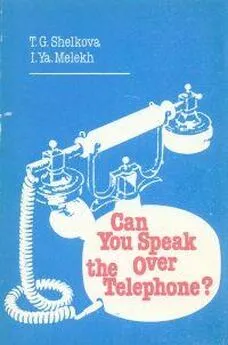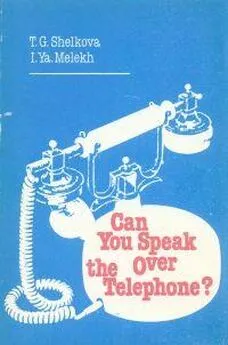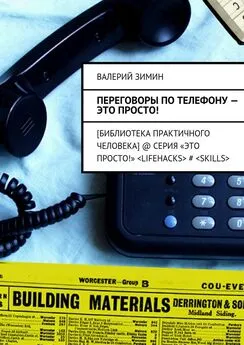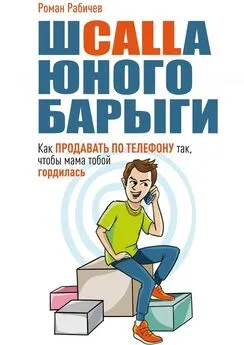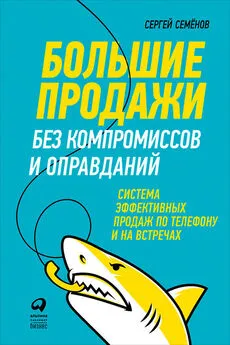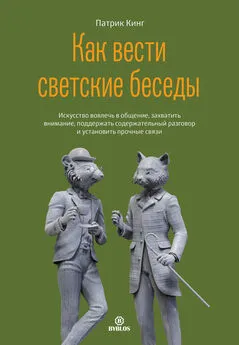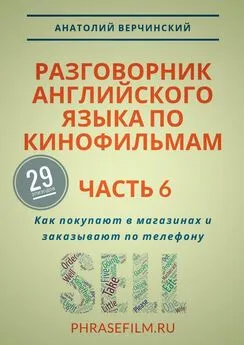Т. Шелкова - Как вести беседу по телефону
- Название:Как вести беседу по телефону
- Автор:
- Жанр:
- Издательство:Высшая школа
- Год:1989
- Город:М.
- ISBN:5-06-001624-2
- Рейтинг:
- Избранное:Добавить в избранное
-
Отзывы:
-
Ваша оценка:
Т. Шелкова - Как вести беседу по телефону краткое содержание
Ведение разговора по телефону на иностранном языке требует от обучающегося определенных навыков понимания, восприятия и удержания в памяти услышанного, а также незамедлительной словесной реакции на услышанное. Недостаточное развитие этих навыков является препятствием к тому, чтобы хорошо и уверенно говорить по телефону.
Пособие ставит своей целью помочь учащимся овладеть навыками беседы по телефону, пользоваться общепринятой терминологией.
Во второе издание (1-е — 1980 г.) внесены исправления редакционного характера.
Для лиц, самостоятельно совершенствующих свои знания английского языка.
Как вести беседу по телефону - читать онлайн бесплатно полную версию (весь текст целиком)
Интервал:
Закладка:
31
then you can have a free hand: the sense is that there will be complete freedom from any hindrance: the “hands” of the workmen will be “free”.
32
That brings us to Thursday morning: note that idiomatic use of “bring” in such sentences as “That brings us to the next item to be discussed”.
33
put it in hand: give instructions to have the job started, e.g. “I’ve got the job in hand”, which means that the job is either being done, or is about to be started.
34
I’m not keeping you from anything: the meaning here is “I’m not preventing you from doing anything else (by talking to you)”.
35
I do have: note the use of “do” here, making the verb emphatic. The effect of the emphasis is softened, however, by the following clause beginning with but.
36
at your disposal: prepared to carry on the conversation. A bit of business phraseology.
37
carry on: continue. Contrast the colloquial use to mean “talk too much”, “make lengthy and tedious assertions”, as in “John is a nice chap, but he does carry on about his health”.
38
outlet ductвыходная труба
39
think to inspect: more usually one would expect to find “think of inspecting”, but “think” may be followed by “to” plus the infinitive form of the verb instead of “of plus present participle, as in “I didn’t think to tell him” vs. “I didn’t think of telling him”.
40
look, Mr Weston: note this rather informal use of the imperative ‘look” as a signal that the speaker wishes to call attention to a proposition or statement he is about to make.
41
loadingsнагрузка
42
Fine: an informal exclamation of approval or agreement
43
Not at all: one of the very few ways in English of replying to someone who has just said ‘Thank you”. For some people it has faintly comic overtones, and these are stronger with the comparable formula “Don’t mention it”. Normally, no reply to “Thank you” is absolutely necessary, but many people feel happier if they say something like ‘That’s all right”, “Pleased to help”, “Glad to be of assistance”, etc.
44
get things moving: an informal way of saying “order work to start”
45
what with that and this: because of that and this
46
up to my ears in it: overloaded with work
47
round fortyish: around forty years old
48
a little bit heavy-going: rather too serious or pompous
49
got his head screwed on the right way: clever, intelligent
50
on hand: available
51
a bit short-handed: short of staff/workers
52
on the packing side: in the packing department
53
like the clappers: very quickly
54
haven’t got round to: haven’t managed to do/begin
55
a bit tricky: rather difficult
56
a spot of: a little
57
bung: put, throw
58
all laid on: all arranged
59
I’m very well, thanks: a slightly formal reply to the question “How are you?” than either ‘Tine, thanks” or “Oh, not so bad; you know”.
60
I’m afraid: a common conversational way of introducing an apologetic note into what is being said
61
there: in that respect
62
organise: note this colloquial use of “organise” to mean “get, obtain” (by means of some kind of planning); e.g. “I feel hungry — I’m going to organise a sandwich for myself.”
63
to do smth. the hard way: to have difficulties to overcome; e. g. ‘The manager came up the hard way — he started as an errand boy.”
64
Great one for the open air: I have a strong liking for the open air. The phrase “a great one for” is sometimes used to indicate strong preferences, as in “Jimmy’s a great one for football”, etc. there often seems to be some humorous intent when the phrase is used.
65
our lot: our family
66
put up with: toletate. Note the difference of meaning with “put up” to mean “accommodate”, as in “They’ll put up noisy kids in that hotel”.
67
give Charles a ring: note the numerous verbs which have to do with making a telephone call. Some of these, beginning with the more formal and ending with the less formal ones are: ‘Telephone X, Ring X, Give X a ring, Give X a tinckle”.
68
a dead loss: someone or something completely useless
69
scrabbling: combines the notions of crawling in and scratching about in (копаться, рыться)
70
popping into: going into. The implication is that it would only be for a short time. “Pop in” is also used of an informal visit, e. g. “If you happen to be passing just pop in and see me, please”.
71
I know just how it is: a phrase used to express concern and sympathetic understanding
72
mum and dad: the speaker’s way of referrring to herself and her husband
73
keep half an eye on: pay some attention to
74
too good to be true: a fixed phrase (так хорошо, что и не верится; невероятно)
75
allowing for: taking into account
76
a lot to offer: a fixed phrase often used for referring to something which has a number of desirable features
77
I tell you what: a colloquial way of introducing a suggestion
78
from over the road: the equivalent in less idiomatic English would be “who live on the other side of the road”
79
pop around: pop into
80
what with the children and the holiday traffic: the sense here is that “because of the children and the holiday traffic” the length of the drive will be a problem. This use of “what with” to mean something like “because of, in view of is quite common in conversational English; e.g. “What with doing the housework and the shopping, I never have a moment to spare”.
81
rattling on: colloquial for “chattering”
82
around: at home; “around the house” meaning “in the house”
83
only too glad: an expressive way of saying “glad”
84
Peatley two-seven-one: although more and more telephone exchanges in Britain are being converted to all-figure numbers, some are still identified by a name
85
How’s things: a colloquial variant of “How are you”
86
Croydon: a suburb of London
87
put me in with a chance: given me a chance
88
short-listed: placed on the “short list” of people who are selected from all the other applicants and given an interview.
89
for goodness sake: a mild exclamation often used to express varying degrees of exasperation
90
on the receiving end: in the position of receiving something
91
in the hot seat: a colloquial metaphor used of any uncomfortable situation
92
I shouldn’t worry too much about it if I were you: this sentence, or something very much like it, is used so often in these circumstances that it amounts almost to a fixed phrase
93
with your qualifications: the sense is that there are unlikely to be many applicants “with such good qualifications”, rather than “with the same qualifications”
94
we’ll see: we’ll see eventually what happens. Often used as a way of expressing doubt about the
95
loaded: loaded with money — a colloquialism
96
I don’t know about: a standard phrase for expressing doubt about whatever it introduces
97
scope: opportunity
98
old Billings: a common informal way of referring to people, especially men. The adjective “old” does not necessarily carry its normal sense, and it’s use in this way often implies a measure of affection.
99
do anyone a bad turn: harm anyone
100
a stick-in-the-mud: someone lacking in enterprise and averse to change. It is a classic instance of the kind of English “idiom” which used, to be collected in phrase books; and it sounds rather odd and a little old-fashioned as so many phrase-book idioms do, probably because they are not used very much nowadays. The most famous of all is perhaps “It’s raining cats and dogs” which no Englishman would ever be likely to say any longer unless he was trying to be funny.
101
move with the times: keep pace with current thinking. Another idiom that to some people might sound a little old-fashioned.
102
Too true: an emphatic way of agreeing’
103
have a bash: have a try’
104
Good for you: a common way of expressing approval of someone’s action
105
Интервал:
Закладка:
